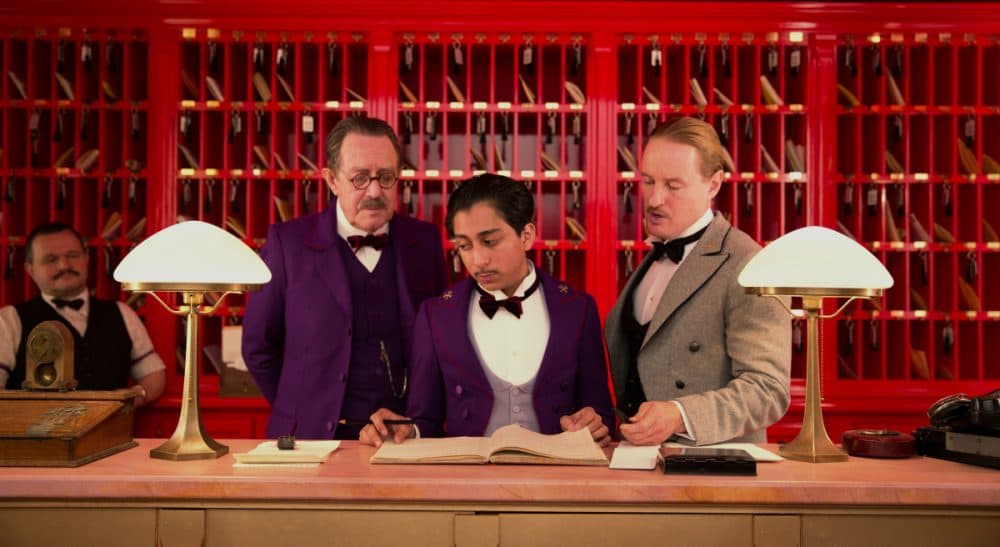Advertisement
‘Based On A True Story’: Searching For Authenticity In The Digital Age

Have you noticed how no one markets a movie these days without claiming that it’s “based on a true story”? This trend was in full effect when my husband and I joined a packed matinee recently to watch “The Grand Budapest Hotel.” The feature film was preceded by four trailers. The first of these was for a new AMC series on spies during the American Revolution. “Based on a true story.” The second, also set in the era of the American Revolution, recounted a tale of a mixed-race woman named Belle. “Based on a true story.” The third, a biopic about Cesar Chavez, was stamped with the same words. Only “Le Week-End” made no such claim.
Serendipitously, “The Grand Budapest Hotel” begins with a commentary on fanciful versus true stories. The movie, itself a series of tales within tales, starts with a mock Soviet-era film interview with the author of the book from which the movie is said to take its name. As the camera rolls, the great man addresses what he believes to be a common misperception: the idea that fiction writers “make up” their stories. Readers think of novels as spun in the writer’s mind from thin air, when they are actually gathered from real lives. Once a man declares himself a writer, he explains, people recount their experiences to him — he just serves as a scribe.
the publicity squads seem convinced that to sell [films] they have to insist that there is some anchor of fact holding the drifting fancies in place. Are we collectively afraid of floating away?
At once implied and mocked in the opening of "Grand Budapest" is the claim that what you are about to watch is “Based on a true story.” It’s a send up of the film trailers that came before.
Yet it seems that we now collectively demand this phrase — this prosthetic aid — in order to suspend disbelief and participate in film. It’s a bit of a mind-bender. No one says that any of these films is “true.” But the publicity squads seem convinced that to sell them they have to insist that there is some anchor of fact holding the drifting fancies in place. Are we collectively afraid of floating away? Shouldn’t we be? So much is suddenly virtual. We wake up to meet the world through our computer screens. In the virtual world, what is fact? What is fancy? The very questions seem naïve. But who is that man on the other side of the world who wants my bank account number? Who would he be if I met him in the flesh? Amidst the billions of global co-inhabitants how many have ever touched your hand, or said your name?
Meanwhile we too are busy selling our virtual avatars: we are intimately familiar with the deceptions, large and small, in the phrase “based on a true story.” Increasingly, we are all urged to sell ourselves at every opportunity. Without putting too fine a point on it, you could say we’re becoming a world of wannabe con men and women, scrambling at once to be seen and to present the profile that displays us in our best light. The farther we venture down this virtual path, the more deeply we seem to long for something more solid than our collective cacophony of inflated claims.
I experience this problem as postmodern, but nonetheless find myself thinking — for the first time in eons — about Herman Melville’s 1857 novel “The Confidence-Man.” The book, both fictionally set and actually published on April Fools’ Day, is a bitter satire on con men and commodity, and a reminder that the United States has long been all about the uneasy, impossible, yet ongoing coexistence of authenticity and commercial sleight of hand. Melville’s two early adventure novels, “Typee” and “Omoo” — both “based on true stories” — sold like hotcakes and made him famous, while his later, more psychologically complex fictions, including “Moby Dick” and “The Confidence-Man,” failed critically and in the marketplace. Not surprisingly, Melville sorely resented this fickle turn. (None of his novels were still in print when he died.)
“The Confidence-Man” is set on a riverboat on the Mississippi. Each passenger is a stranger to the others. Virtually all are con men of one stripe or another. Successful conning depends on being among strangers. (It is possible, but more difficult, to deeply fool people who know you in several contexts and across time.) And we are strangers to each other now more than ever. Rarely does another person witness all the details of our day. Nor do most of us any longer live in the old 10-in-a-bedroom, 60-sharing-one-bathroom in a tenement, five-hundred–in-a-mutually-scrutinizing neighborhood or village arrangement of the past.
Ever the introvert, I thank my lucky stars.
We posture confidence, but we crave to know what’s no longer automatically granted: how much our mind resembles someone else’s...
Yet, while we’re less directly impinged upon by forced proximity, we’ve paid a not-so-obvious price. We no longer have enough unchosen contact with other living, breathing, belching fellow creatures to sort out what’s more broadly human and what’s just ours. We have lost an immediate, gut sense of how life actually is for others, and we have become disoriented, even at times a tad desperate, in its absence. We posture confidence, but we crave to know what’s no longer automatically granted: how much our mind resembles someone else’s; how much our oddities and mild depravities are widely shared; what possibility exists for us to transcend ourselves. And exactly how do other people live their lives. Do they suffer as we suffer? We seek tangible answers.
We are strangers on a virtual global, careening riverboat — we scramble to find common facts to unite us. We want to see films “based” on true stories in the hope that we can glimpse some bit of confirmation, find footing on a slippery deck. We long to be reassured, even as we look in the wrong places, and become tangled in ironies. And yet, the riverboat paddle spins, the muddy banks fly by, the afternoon breeze refreshes whoever’s out and leaning on the rail. And, in a brief video loop from the recesses of my own mind, faded, silent, Herman Melville shakes his head, then slightly, almost in spite of himself, cracks a smile, watching us try to live this heightened fun-house remake of the pages he scribbled out so long ago.
